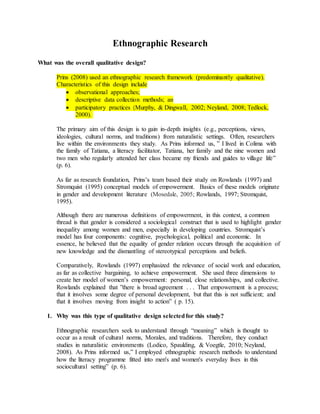
Ethnographic Research Sample
- 1. Ethnographic Research What was the overall qualitative design? Prins (2008) used an ethnographic research framework (predominantly qualitative). Characteristics of this design include observational approaches; descriptive data collection methods; an participatory practices (Murphy, & Dingwall, 2002; Neyland, 2008; Tedlock, 2000). The primary aim of this design is to gain in-depth insights (e.g., perceptions, views, ideologies, cultural norms, and traditions) from naturalistic settings. Often, researchers live within the environments they study. As Prins informed us, ” I lived in Colima with the family of Tatiana, a literacy facilitator, Tatiana, her family and the nine women and two men who regularly attended her class became my friends and guides to village life” (p. 6). As far as research foundation, Prins’s team based their study on Rowlands (1997) and Stromquist (1995) conceptual models of empowerment. Basics of these models originate in gender and development literature (Mosedale, 2005; Rowlands, 1997; Stromquist, 1995). Although there are numerous definitions of empowerment, in this context, a common thread is that gender is considered a sociological construct that is used to highlight gender inequality among women and men, especially in developing countries. Stromquist’s model has four components: cognitive, psychological, political and economic. In essence, he believed that the equality of gender relation occurs through the acquisition of new knowledge and the dismantling of stereotypical perceptions and beliefs. Comparatively, Rowlands (1997) emphasized the relevance of social work and education, as far as collective bargaining, to achieve empowerment. She used three dimensions to create her model of women’s empowerment: personal, close relationships, and collective. Rowlands explained that ”there is broad agreement . . . That empowerment is a process; that it involves some degree of personal development, but that this is not sufficient; and that it involves moving from insight to action” ( p. 15). 1. Why was this type of qualitative design selectedfor this study? Ethnographic researchers seek to understand through “meaning” which is thought to occur as a result of cultural norms, Morales, and traditions. Therefore, they conduct studies in naturalistic environments (Lodico, Spaulding, & Voegtle, 2010; Neyland, 2008). As Prins informed us,” I employed ethnographic research methods to understand how the literacy programme fitted into men's and women's everyday lives in this sociocultural setting” (p. 6).
- 2. 2. What was the problem statement? The nature of the inquiry was twofold. In that, (a) researchers wanted to know what effect would participation in a Freirean literacy programme have on a small group of Campesinos people—as far as fostering or limiting women’s and men’s personal, interpersonal and collective empowerment. And (b), what effect would the educational experience (e.g., attending classes) have on the group as a whole because the majority of participants had little or no formal education (Prims, 2008, p. 6). 3. What was the purpose of the study and what were the research questions (if stated)? As Prins (2008) stated,” this study examines both socioeconomic and gender inequalities because male and female research participants were campesinos (peasants, rural people) with scarce material resources and political power; women and girls experienced gender subordination; and both men's and women's views and actions shape gender hierarchies” (p. 4). Although Prins’s research team did not site a research question directly, the nature of the inquiry was to, “. . . examine how participating in a Freirean inspired literacy programme fostered and/or limited women's and men's personal, interpersonal and collective empowerment” (p. 6). 4. What was the sample and sampling technique used? Researchers used participants from two Salvadoran villages, Colima and Rosario de Mora. They recruited ten volunteers (four women and six men) to serve as facilitators; all participants had had some formal education (high school or less), and they received eight to ten hours of training. The research team formed ten literacy groups, which of their accord, divided themselves into groups by gender (27 women and 26 men, ages ranged from 13 to 66 years). The groups attended classes for four months (two to three times weekly). 5. What data collection techniques were employed? Prins’s research team used a Freirean inspired curriculum design that included generative themes and discussions; observations; field notes (research activities); Interviews; participatory methods (e.g., drawings, maps, words and symbols, practice exercises, ranking matrices, audio recordings, and skits); and document analysis (p. 6). 6. What ethical issues might exist with this study? Why?
- 3. Ethnographers, including the American Anthropological Association (AAA), the Society for Applied Anthropology (SFAA), and institutional review boards (IRB). These governing bodies highly emphasize the integrity of research findings, the relevance of participants’ confidentiality, participants' safety and the right to privacy, as well as the importance of informed consent (Lodico, Spaulding, & Voegtle, 2010; Merriam, & Tisdell, 2016). As indicated, Prins’ research team adhered to these guidelines and policies. References Lodico, M., Spaulding, D., & Voegtle, K. (2010). Methods in educational research: From theory to practice (Laureate Education, Inc., custom ed.). San Francisco: John Wiley &Sons. Merriam, S. B., Tisdell, E. J. (2016). Qualitative research: A guide to design and implementation (4th ed.). San Francisco: Jossey-Bass. Mosedale, S. (2005). Assessing women's empowerment: towards a conceptual framework. Journal of international development, 17(2), 243-257. Murphy, E., & Dingwall, R. (2002). The ethics of ethnography. In P. Atkinson, A. Coffey, S. Delamont, J. Lofland, & L. Lofland (Eds.), Handbook of ethnography (pp. 339-351). London: Sage. Neyland, D. (2008). Organizational ethnography. London: Sage Rowlands J. (1997). Questioning empowerment: Working with women in Honduras. Oxfam: Oxford. Stromquist NP. (1995). The theoretical and practical bases for empowerment in women, education and empowerment: Pathways towards autonomy, Medel-Anonuevo C (ed.). UNESCO Institute for Education: Hamburg. Tedlock, B. (2000). Ethnography and ethnographic representation. In N. K. Denzin & Y. S. Lincoln (Eds.), Handbook of qualitative research (pp. 455-486). Thousand Oaks, CA: Sage .
